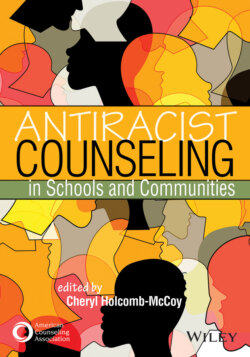Читать книгу Antiracist Counseling in Schools and Communities - Группа авторов - Страница 21
Black/African-Centered Psychology
ОглавлениеMore than 40 years ago, White (1972) argued that the lived experiences of persons of African ancestry in the United States demanded a shift in conceptualizing psychology. With the assassination of Martin Luther King Jr. came an intense need to lift up the Black community and an affirmation of Blackness. This era heralded the beginning of the Black psychology movement, which solidified when the Association of Black Psychologists (ABPsi) was established in 1968 at the annual convention of the American Psychological Association. ABPsi emerged out of the American Psychological Association’s lack of responsiveness to the needs of Black psychologists and the communities they served. In the press release announcing its establishment, the need for a community-centered organization committed to ethnocentrism and the needs of Black people and Black psychologists was stated as the impetus for the new organization (Williams, 1974, pp. 11–12). See Box 1 for Black/African-centered psychology scholars in the field. ABPsi (2021) defined Black/African-centered psychology as follows:
It is the intention of the Committee to Advance African Psychology (CAAP) to establish a framework for content provided during the African Psychology Institute (API) that adheres to the values and principles expressed therein. In recognition of the diverse historical experiences and cultural expressions within and between peoples of African ancestry, the following is the accepted definition:
“Black/African Centered psychology is a dynamic manifestation of unifying African principles, values and traditions. It is the self-conscious “centering” of psychological analyses and applications in African realities, cultures, and epistemologies. Black/African centered psychology, as a system of thought and action, examines the processes that allow for the illumination and liberation of the Spirit. Relying on the principles of harmony within the universe as a natural order of existence, Black/African centered psychology recognizes: the Spirit that permeates everything that is; the notion that everything in the universe is interconnected; the value that the collective is the most salient element of existence; and the idea that communal self knowledge is the key to mental health. Black/African Centered psychology is ultimately concerned with understanding the systems of meaning of human beingness, the features of human functioning, and the restoration of normal/natural order to human development. As such, it is used to resolve personal and social problems and to promote optimal functioning.” (paras. 1–2)
Overall, the Black psychology movement was a period of academic progression in combining and applying Black studies with traditional psychological frameworks, encapsulating new approaches, terms, and structures for understanding Black people. Akbar (2004) described Black/African-centered psychology as follows:
[It] is not a thing, but a place—a view, a perspective, a way of observing. African Psychology does not claim to be an exclusive body of knowledge, though a body of knowledge will continue to be generated from the place. It is a perspective that is lodged in the historical importance of the human view from the land known as Africa. (p. ix)
In a special issue of the journal Cultural Diversity and Ethnic Minority Psychology, Holliday (2009) outlined the history of African Americans and Blacks in psychology in the United States. It is interesting that Holliday noted that in 1934, the Journal of Negro Education (published by Howard University) developed a special issue of 14 papers that challenged the functions and findings of research on racial differences.
